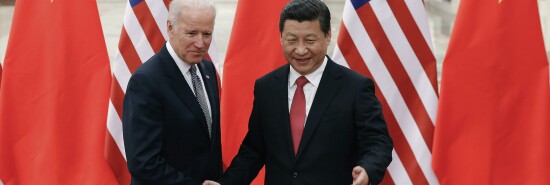
Biden’s meeting with Xi is the most important of his life
Washington Examiner
President Joe Biden’s meeting with Chinese President Xi Jinping on Monday will be the most important of his life. Biden must ensure that Xi does not come away from their interchange with a mistaken understanding or detrimental opinion of his opposite number. This will be Biden’s first meeting with Xi since he became president. Biden has aged since Xi last met with him during the latter’s 2015 state visit to the United States. It is key, then, that Biden shows Xi he is in confident command of the U.S. government and military. The importance of this understanding can be informed by one word.
A growing number of U.S. military analysts now believe that Xi may order an attack on Taiwan in the 2023-2027 window. Yet, since becoming president, Biden has pledged four separate times that the U.S. military will intervene in Taiwan’s defense in the event of such an attack. Considering that Xi views the Communist Party’s absorption of Taiwan as the ultimate fulfillment of his destiny, the risks of a U.S.-China war are now significant. Biden must thus ensure that Xi is left with no sense that he is weak or unsure. If he fails to appear resolute, Biden risks inviting Xi to act against Taiwan before a possibly more hawkish U.S. president and Congress enter power.
Biden must thus show himself as composed and confident. Xi and his minions will be watching Biden assiduously for any sign of weakness or mental vulnerability. There can be no slip-ups. Beyond this basic requirement, however, Biden must broadcast a message of strength.
The president must then clarify to China’s all-powerful leader that the U.S. will not accept a unilateral effort to change the status quo in the Taiwan Strait. He must state that all options are on the table and that the U.S. has a historical and ideological commitment to ensuring that Taiwan remains free. Xi will, of course, insist that Biden’s very mention of the Taiwan issue constitutes interference in China’s domestic affairs. Xi will insist that the U.S. risks the worst possible consequences by its interference. But Biden must not be dissuaded. The president must remember that the only thing that Xi fears more than he desires Taiwan’s submission is a failed attempt to achieve that submission. Were Xi to lead the People’s Liberation Army to the bottom of the Taiwan Strait, his rule and that of the Communist Party might well come into question. If Biden can persuade Xi that the U.S. is likely to act over his attack on Taiwan, he may be deterred from doing so in the first place.
Beyond Taiwan, Biden must reject any contention by Xi that the U.S. is singularly to blame for the current malaise in Sino-American relations. Xi is certainly likely to make that argument. As China’s Global Times propaganda outlet declared on Friday, “It must be said that the difficult situation in China-U.S. relations today is entirely caused by the wrong perception and behavior of some people on the U.S. side.”
The editorial concluded, “We hope that Washington will take a responsible attitude and meet China halfway.” This silliness underlines Beijing’s confusion and rage over the manner by which the appeasement policies of the Obama administration are now a distant memory. Beijing wants a return to the good old days when all it needed to escape responsibility for its rampant intellectual property theft, malicious trade manipulation, military coercion, and grotesque human rights abuses was to repeat ad infinitum its deceptive call for “win-win cooperation.”
The truth is that U.S. policy toward China has changed for the same reason that European policy toward China is changing (if too slowly). Namely, that China has chosen to act to the deliberate detriment of U.S. national interests. Biden has a right and a responsibility to tell Xi that he cannot accept China’s effort to use American technology to advance his own imperial ambitions. That he cannot accept China’s effort to replace the U.S.-led democratic international order with an order of Beijing-led feudal mercantilism. That he cannot accept China’s undermining of American prosperity, security, and sovereignty. Biden should tell Xi that if China doesn’t like something the U.S. is doing, it should tell the U.S. that. And that the U.S. will listen in respect for the value of dialogue and diplomacy. But Biden should inform Xi that even in areas where cooperation is preferable and possible, listening is not the same as following Beijing’s orders. He should make clear that the U.S. has the resolve and means to act in the defense of its national interests.
CLICK HERE TO READ MORE FROM THE WASHINGTON EXAMINER
Biden’s mission in this meeting, then, is clear. The president must show Xi that even as he seeks dialogue and the avoidance of war, America will not be cowed or corralled in standing up for its interests. If Biden can achieve this objective, the meeting will be a success. If he fails, the consequences may be disastrous.
